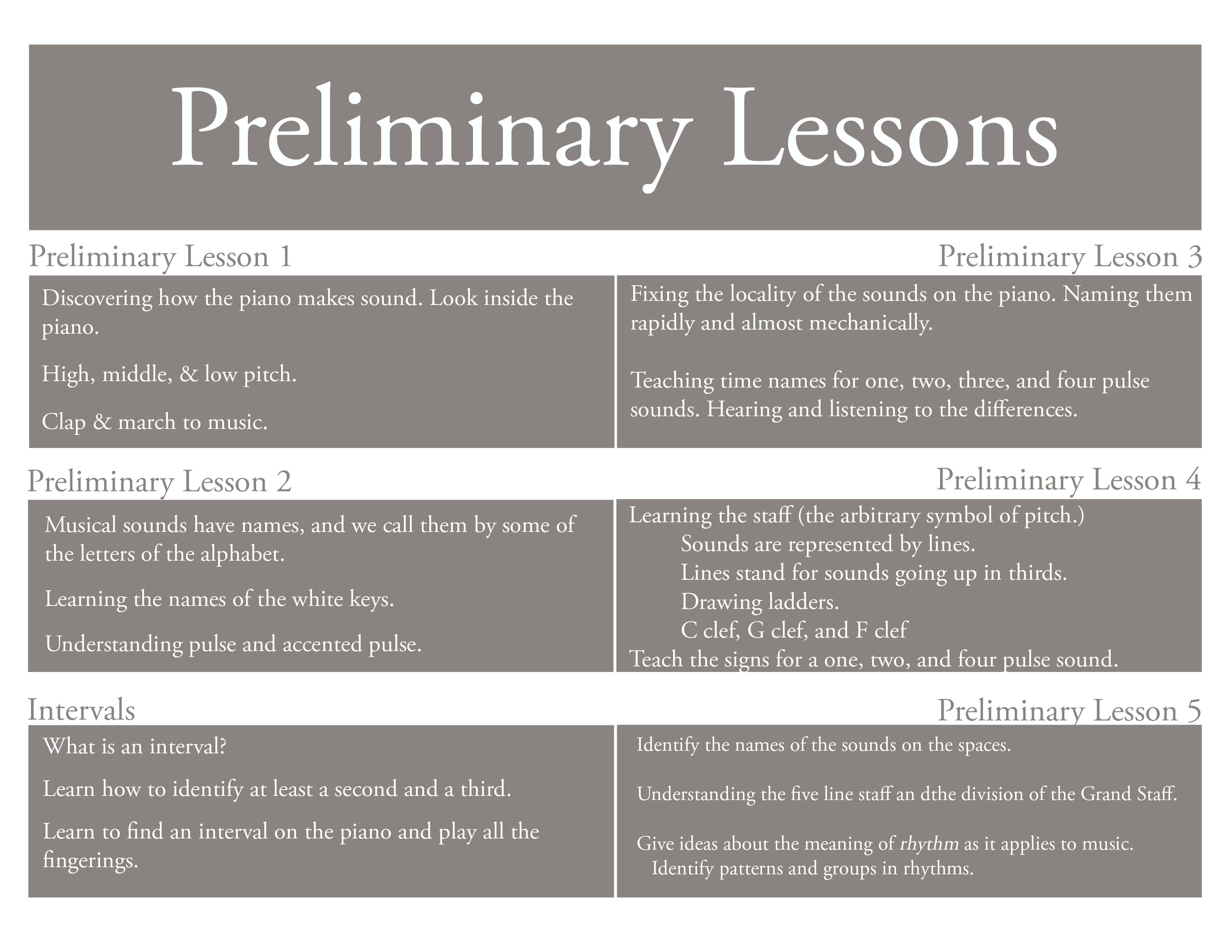What is the depth and breadth of the content to be taught here? What is the order in which the content should be taught for the best learning? These are the questions I’m hoping to clearly answer here.

If you aren’t up for reading Mrs. Curwen’s Teachers Guide, I highly encourage you to start with this article. You’ll be taken to a PNEU article titled The First Music Lessons. It’s written by Mrs. Curwen.
Here’s the most common question. How old should my child be when they start taking piano lessons?
The piano lessons should not be begun before six years old, and for some children seven, or even eight, is better still.
The Preliminary Lessons are all orally taught. The lessons are almost exclusively discovery, listening, and observing. There is also much dialogue between the student and the teacher.
How long will this preliminary stage last?
This is completely dependent upon the student. Besides the fact that all students are different and will move forward with varying progress, here are a few things that will also influence the length of the preliminary stage:
- age
- frequency of lessons
- how much help the student receives between lessons
- previous musical experiences
In other words, some students may pass out of the preliminary stage in a few short weeks. Others will take an entire term. Always go at the student’s pace.
Mrs. Curwen also feels that,
‘young children do better with a short daily lesson than with a longer weekly one.’ (page 33, 31st edition)
She goes on to say that,
‘very excellent results have been obtained when a visiting teacher has given a weekly lesson of one hour, the homework being superintended by mother or governess, who must be present at the less if her assistance is to be of any use.’ (page 33, 31st edition)

Charlotte Mason’s Recommend Scope and Sequence for Mrs. Curwen’s Method
Many of you are here because you are curious about Charlotte Mason’s philosophy of music. What is her recommended scope and sequence regarding piano?
To the best of my knowledge, Miss Mason does not specify the pace at which a child should be progressing through Mrs. Curwen’s Child Pianist. It appears, though, after Forms I and II, that I don’t see the continue Curwen’s Child Pianist in the program lists.
I haven’t discovered yet if the expectation was for children to continue piano after Form II. Or if other forms of music training outside of piano take its place. Or if it was assumed piano would continue, but was no longer listed in the programs.
The program lists I’m referencing can be found here:
https://www.amblesideonline.org/pneu
With that being said, I have discovered that, in general, my students move at a much slower pace than I believe is the unspoken expectation set forth in Mrs. Curwen’s method. This is completely personal opinion. All my students move at different paces, but I am learning that lots may have changed since 1900.
Piano and Other Musical Instruments
I will reference one original PNEU article posted on Charlotte Mason Poetry where a Mrs. Howard Glover makes a few statements regarding benefit the learning of piano and then specializing on a different instrument. Perhaps, this is why piano is not always listed in more advanced Forms, but the expectation seems that a child is advancing on some type of musical instrument.
“The choice and suggestion of an instrument lies to a great extent in the parents’ hands. I think it very advisable that everyone should learn the piano to the age of nine or ten, as it is a better medium for studying the general theory of music than perhaps any other instrument. After that stage, if your children show any promise of musical capacity, do not be content to let them all swell the crowded ranks of pianists and violinists, but induce one or two in the family to take up the viola, ’cello, clarionet, or other instruments, which are so sorely needed for amateur chamber music and orchestra. It is quite common for school-girls, and even school-boys, to attempt two instruments, but unless the general education is to suffer, it is impossible to do justice to both. When we remember what an exacting mistress instrumental music is, the time would be far better employed in working seriously at one instrument.”
